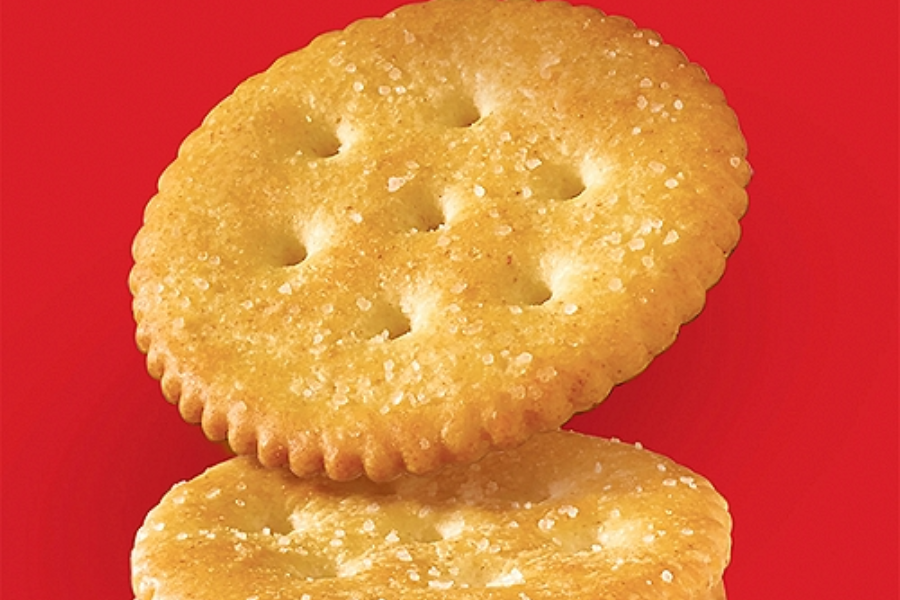Have you ever caught your furry friend eyeing the snack in your hand, especially when it’s something as tempting as Ritz crackers? This leads to the question many pet owners wonder: Can dogs eat Ritz crackers? Let’s talk dog snack! A good mix of proteins, carbs, fats, and vitamins keeps your pup happy and healthy.
In this article, we will explore the details of the question of whether Ritz crackers are safe for dogs to consume. Let’s look further in the ingredients and nutrition that Ritz crackers affect a dog’s dietary. You can learn about the benefits and downsides of feeding your dog Ritz crackers, along with healthier alternatives to consider. This guide ensures that snack time is enjoyable and safe for everyone involved.
Understanding Ritz Crackers

Let’s dive into the world of Ritz Crackers. We all love this timeless snack, right? But what’s the story behind it? And what’s in these crackers that we need to think about when it comes to our furry friends?
The Story of Ritz Crackers
Ritz Crackers were introduced by Nabisco in 1934 during the Great Depression. The distinctive round shape, seven perforations, and scalloped edges of Ritz Crackers are not just about aesthetics. The crackers’ rich, buttery flavor, and light, flaky texture have made them a hit across generations. Today, Ritz Crackers are enjoyed worldwide, adapted in various countries to suit local tastes.
What’s in a Ritz Cracker?
Breaking Down the Ingredients
Let’s look inside a Ritz Cracker. You’ve got basic stuff like flour, soybean oil, and sugar. Then there’s stuff to make it rise (like baking soda), a bit of salt, and some natural flavor.
These ingredients combine to give Ritz Crackers their classic taste and texture. Over the years, Nabisco has made some changes to the formula, such as removing trans fats, to align with health concerns and nutrition guidelines.
Caloric Content
A single Ritz Cracker typically contains around 16 calories.
A serving size, often listed as 5 crackers on the package, would therefore contain approximately 80 calories.
Can Dogs Eat Ritz Crackers?
Some things in Ritz Crackers might not be so great for dogs. Too much salt can make dogs thirsty and cause other health problems. Sugar isn’t good for dogs either, it could lead to weight gain and tooth trouble. And that ‘natural flavor’? It’s a mystery. It could include things that aren’t safe for dogs.
The Impact of Ritz Crackers on Dogs

Let’s talk about how salt and fat in Ritz crackers can harm our dogs.
Salt and Fat in Ritz Crackers: Not Good for Dogs
Ritz crackers are salty and fatty which can make our dogs sick. They might throw up, get diarrhea, shake a lot, or even have seizures. Too much fat isn’t good either. It can cause painful belly problems, make our dogs fat, and lead to other health problems like diabetes and heart disease. It’s important to understand how certain human foods, like Ritz Crackers, can affect dogs.
High Sodium Content : Bad News for Dogs
High sodium intake in dogs can lead to salt toxicity, which may cause symptoms like excessive thirst, urination, and even sodium ion poisoning in severe cases. A pet’s salt intake shouldn’t exceed 1.5 percent of total calories, says the Merck Veterinary Manual. When you consider that a small dog only needs approximately 100 mg of salt per day, the 200 mg of sodium in only five Ritz Crackers is quite a bit.
Fat Content: Silent Killer
Ritz Crackers are high in fats, primarily from soybean oil. Excessive fat consumption can lead to pancreatitis in dogs, a serious and painful condition. Studies, including those published in the Journal of Animal Science, have shown that obesity is a growing problem in the pet population, with over 50% of dogs being classified as overweight or obese.
Ritz Crackers vs. Other Snacks

In conclusion, while an occasional Ritz Cracker is unlikely to harm a dog, regular consumption is not advised. The high sodium, fat content, and lack of nutritional value make them an inappropriate snack for dogs.
Dogs’ bodies are different than ours. They can’t handle the same foods we can. So even though we might enjoy these snacks, they can be harmful to our dogs.
Allergic Reactions to Ritz Crackers
Let’s talk about dogs and Ritz crackers. Not all human foods are safe for our furry friends. Some stuff in Ritz crackers could make your dog sick. So, we need to be careful.
Dogs can be allergic to dairy and wheat. These are Ritz crackers. Also, some other stuff that’s hard to pronounce can make your dog feel bad. If your dog eats these crackers, keep an eye on them.

So, how can you tell if your dog is allergic? Dogs show signs just like we do when they’re not feeling well. Dogs might excessively scratch or lick these areas. They could also throw up or have diarrhea. Some dogs might also show a lack of appetite. If this happens after your dog eats Ritz crackers, discontinue the food right away.
Remember, every dog is different. Some dogs might not feel good, but others could get really sick. In some cases, it could even be a life-or-death situation.
So, even though we humans love Ritz crackers, they might not be the best for our dogs. If you want to give your dog new food, watch them closely afterwards. And if they seem sick, talk to your vet. It’s always better to be safe than sorry.
Looking At Advantages and Disadvantages of Ritz Cracker
We all love our dogs and want to give them tasty treats. So let’s look at the good and bad things about giving your dog Ritz crackers as a treat.
The Good Stuff
Ritz crackers are handy, and dogs love them. They’re a quick treat when you don’t have dog snacks around. But remember, these crackers are a’sometimes treat’ and not for everyday use.
The Not-So-Good Stuff
Sometimes, Ritz crackers can upset your dog’s tummy. If they’re not used to human food or if the crackers are too salty or fatty, they might feel sick.
If your dog eats these crackers a lot, they might not get enough good stuff like protein, fats, and vitamins that they need to be healthy. Ritz crackers also have a lot of salt and fat. Too manya sometimes of these can make your dog very sick over time. They could get too fat, have heart problems, or troubles with their kidneys. Don’t forget, what’s a small snack for us is a big one for our small friends.
So, it’s best to give your dog food that’s made for them. It has all the healthy stuff they need. Ritz crackers and other human food should only be a special treat once in a while, not a regular part of their meals.
What Experts Say About Dogs Eating Human Snacks?
We’ve heard from a bunch of experts about dogs eating human snacks like Ritz crackers. Here’s what they told us.

What the Expert Say?
Opinions are mixed when experts talk about dogs munching on human food. Here’s the lowdown from vets and dog nutrition gurus.
Most vets say to be careful. Dr. John Anderson, a top dog doctor, says, Giving your dog a human snack once in a while won’t hurt, but do it too often, and you could have problems like a fat dog or a sick pancreas. He also reminds us that some human snacks have stuff in them that’s bad for dogs. It’s safer to stick with treats made for dogs.
Another vet, Dr. Sarah Miller, admits that a little human snack can sometimes help with training your dog. But she says, Don’t do it too much, and know what’s in the snack. Stay away from anything with a lot of salt or fake stuff.
Some experts debate that some human food can be good for dogs. For example, fruits and vegetables have vitamins and fiber that are good for dogs.Stay away from processed snacks like Ritz crackers that have a lot of salt and fat. If you want to give your dog a human snack, make it a healthy one, like a carrot or an apple.
In Short
We’ve really explored the ins and outs of dogs and Ritz crackers, haven’t we? These crackers have a lot of salt and fat, which isn’t great for your dog’s health and might lead to issues like putting on extra weight or even problems with their kidneys. Remember to watch out for signs like scratching a lot. There’s also a small chance that your dog could be allergic to these crackers.
Now, that doesn’t mean you can’t ever treat your dog to a Ritz cracker. Just remember to give them in small amounts. It’s all about balance. So, before you start a new snack routine, it’s always a good idea to chat with your vet or a pet nutrition expert.
